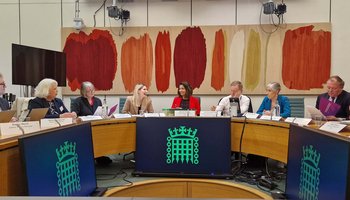
At the ODI, we’ve spent a lot of time over the last few months thinking about, and talking about data legislation. Lately, we’ve been working on the Data Protection and Digital Information (DPDI) bill, the AI White Paper consultation, and have given evidence at two parliamentary select committees.
It’s important not to forget about the importance of data as a tool to improve policy making - and luckily a recent request by the Treasury Select Committee to give evidence as an expert witness provided the perfect opportunity to talk about it!
I provided evidence to the Committee in a session about “Intergenerational Inequality and Social Mobility”. I wore two hats, so to speak. In addition to my role at the ODI, I was appointed by the Cabinet Office to be a Social Mobility Commissioner - and in this position, I spend two days a month holding the government to account, and advising them on how to improve social mobility.
Committee members had questions ranging from pensions to early years education, house prices to university education, and from mortgage insurance to taxes.
As I told the Committee, without good data, it’s really difficult to analyse and provide evidence on what the issues really are and where the challenges lie. This applies to every area of policy making, and every type of policy tool. But data alone isn’t enough. We need to have good quality, well maintained, machine readable data. We need to have accepted and widely adopted standards to assure the data - and those using it - so that the data, data practices and decisions made can be trusted.
The ODI describes data assurance as “the process, or set of processes, that increase confidence that data will meet a specific need, and that organisations collecting, accessing, using and sharing data are doing so in trustworthy ways”. In fact, the global data assurance market is projected to grow by 60% in the next five years as businesses look to build trust in the data that they use, and increasingly rely on. Our report, based on research conducted by Metia Group, shows the need for accepted practices, standards and codes of conduct.
We know that data assurance is essential if we want to enable trusted and trustworthy data practices. Many organisations struggle with designing and implementing data assurance programmes, so we are developing new tools and services to help businesses assess, build and demonstrate trustworthiness with data while minimising the risks of data sharing.
At the same time, people often look at data and interpret it in different ways. People’s backgrounds, education, and life experiences all impact the perspective that they bring to data: how they choose to interpret it; how they choose to analyse it; and how they choose to report. The more aware we are of these biases, the more we can do to address them.
The increasing use, and reliance, on data means that we need to give people working with it - including the general public - the tools and skills to be able to look at data and the ways it’s used with a critical eye. It should not just be the government or those who steward data that have the ability to analyse it, or critique the decisions that are made with it. We believe that as much as possible, data should be open - so that people with lived experience and different perspectives can access, use and share it.
We also think it’s really important for the government - at all levels - to evaluate what data is available, what is not, and address the gaps. We wrote in detail about our desire to see increasing data skills in our recent response to the Data Protection and Digital Information (No 2) Bill. The government, and organisations that hold data, should also consider how interoperable - or machine-readable - data is. If it's not, steps should be taken to address this. For data to benefit society, the economy and the environment, it has to be able to flow between machines in different organisations. This has the potential to enable organisations to make better decisions, and governments to design more effective policies.
In my evidence session to the Treasury Select Committee I was able to apply the need for better data when they asked about social mobility. The reality is, our ability to assess, evaluate, and improve policy making in this area is constrained by the lack of available data. The better data we have, the more we can assess the way policies are working - for the intended and the unintended consequences.
It is also easy to be influenced by beliefs or ideology rather than informed by data and evidence, and this can lead to policy decisions - and funding - being used in less efficient ways. The ODI’s recent Fuel Poverty Report is an example of how data can lead us to conclusions that differ from popular opinion. While it’s often assumed that pensioners are most likely to suffer from fuel poverty, the data that we analysed showed us how renters the young, large households, lone parents and those with young children are disproportionately impacted by fuel poverty. In fact, our research indicated that fuel poverty impacts 28.8% of households where the eldest occupant is 16-24 years old, and it impacts 10.1% of households with at least one occupant over the age of 60 (the research brought together 12 datasets on fuel poverty for the first time, with data from a national, local and local authority level).
Having access to good data, and confidence that it is trustworthy, allows policy makers to make strategic decisions about how best to use taxpayers’ money - and wider national resources - to help people who need it most. The more data we have, the better quality the data is, and the more we can overlay data sets and link them, the more we can inform and shape policy to tackle issues in an effective way.
In addition, data can help us understand how systemic shocks impact a wide range of outcomes. Data collected from before, during, and after the pandemic, for example, helps us to see the impact - and likely ongoing consequences - of Covid-19 Some of the consequences will need to be tracked for years to come to see the true impact. We know, for example, that students who had families using food banks during the pandemic had GCSE grades that were on average half a grade lower than expected.
From previous Social Mobility Commission work, we also know that the poorest children, even before the pandemic, started school four and a half months behind their peers. By the time they leave school at 18, they are 18 and a half months behind their more advanced socioeconomic peers. We already knew that those differences were an issue before the pandemic, and it is important that we have as many interoperable data sets as possible so that we can get the most accurate picture possible about the impact on children and young people. This means not only being able to see data on education outcomes but also on health, mental health, employment, welfare, and housing.
As the ODI has said before, it is really important that the government opens up data, and that we shift to a viewpoint where data is viewed as public infrastructure.
When it comes to policy, what gets measured gets done. At the ODI, we will continue to advocate for open data, data assurance and better data skills and knowledge for all.


